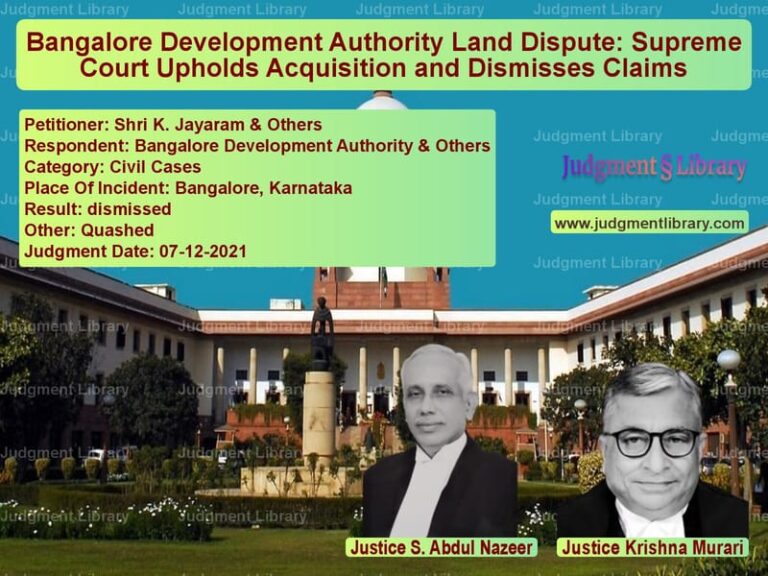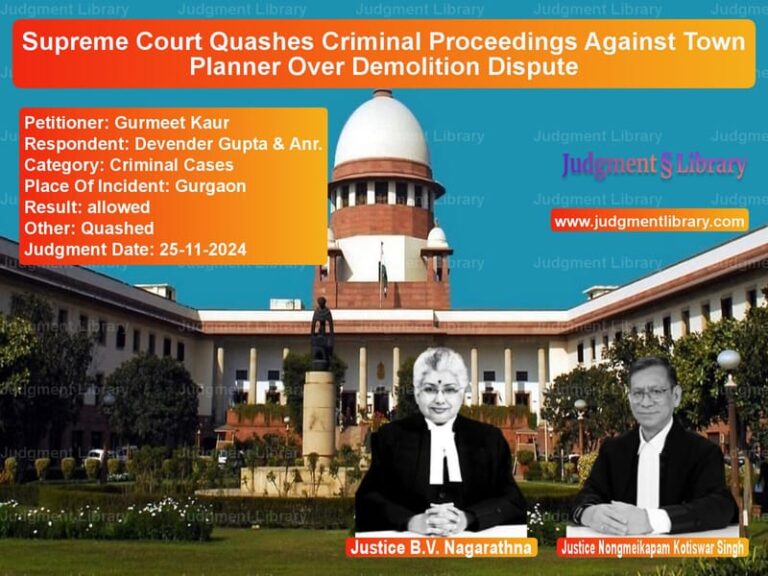Employment Dispute Over OBC Certificate: Supreme Court’s Ruling
Public sector recruitment in India follows a strict procedure, ensuring equal opportunities for candidates from all sections of society. However, disputes often arise regarding documentation, eligibility, and procedural compliance. One such dispute led to the Supreme Court case of Karn Singh Yadav v. Government of NCT of Delhi, where the petitioner challenged the rejection of his candidature for an ‘A’ Grade Staff Nurse position due to the late submission of his Other Backward Class (OBC) certificate.
Background of the Case
The Municipal Corporation of Delhi (MCD) issued an advertisement on August 30, 2007, inviting applications for the post of ‘A’ Grade Staff Nurse. The petitioner, Karn Singh Yadav, applied for the position under the OBC category. However, his application was rejected on the grounds that he had not submitted his OBC certificate before the cut-off date.
Feeling aggrieved, Yadav challenged the rejection before the Delhi High Court through Writ Petition (C) No. 55 of 2013. The High Court dismissed his petition, following which he approached the Supreme Court.
Read also: https://judgmentlibrary.com/supreme-court-remits-panchayat-employees-dismissal-for-fresh-inquiry/
Petitioner’s Arguments
Karn Singh Yadav argued that:
- He belonged to the OBC category and possessed a valid certificate.
- The certificate’s delayed submission was a minor procedural lapse and should not have led to his disqualification.
- He should have been given the opportunity to rectify the documentation issue, considering that he met all other eligibility criteria.
- Similar cases had been decided in favor of the candidates by the Supreme Court in the past.
Respondents’ Arguments
The Government of NCT of Delhi and the recruiting authorities contended that:
- The recruitment process had clear guidelines, including the mandatory submission of OBC certificates before the cut-off date.
- Allowing post-deadline submissions would create administrative complications and set a precedent for future cases.
- The rejection of Yadav’s application was in line with established rules, and the decision of the High Court should be upheld.
Supreme Court’s Observations
The Supreme Court, consisting of Chief Justice Uday Umesh Lalit, Justice S. Ravindra Bhat, and Justice J.B. Pardiwala, examined the case in light of previous rulings and legal principles.
1. Precedent in Similar Cases
The Court noted that a similar issue had been addressed in Ram Kumar Gijroya v. Delhi Subordinate Services Selection Board & Another, (2016) 4 SCC 754, where it ruled in favor of the candidate. The Court held in that case that non-submission of an OBC certificate before the cut-off date should not automatically lead to disqualification if the candidate belonged to the reserved category and had a valid certificate.
2. Procedural Flexibility vs. Strict Adherence
The Court acknowledged the necessity of deadlines in recruitment processes but also emphasized the principle that technical lapses should not defeat substantive rights. The Court remarked:
“An identical fact situation came up for consideration before this Court in Ram Kumar Gijroya, wherein this Court ruled in favor of the concerned candidate.”
3. Lack of Substantial Relief Due to Time Lapse
Despite ruling in Yadav’s favor on legal grounds, the Court noted that more than a decade had passed since the recruitment process took place. The petitioner had not been appointed due to the rejection of his application, and at this stage, granting any meaningful relief would be impractical. The judgment stated:
“However, it must be noted here that as a result of the cancellation of the candidature, the appellant was never appointed to the post in question, and at this length in time, it will not be possible to grant any substantial relief to the appellant.”
Final Judgment
While recognizing that Yadav’s application was wrongly rejected based on procedural grounds, the Supreme Court concluded that the passage of time rendered the case effectively moot. Consequently, the appeal was disposed of without any further relief being granted.
Implications of the Judgment
This case highlights the delicate balance between procedural rigor and substantive justice in public sector recruitment. Key takeaways include:
- Precedents Matter: The Court reaffirmed that its previous decision in Ram Kumar Gijroya applied to similar cases.
- Timeliness is Crucial: While candidates may win legal battles, the delay in resolution can render relief ineffective.
- Future Considerations: The ruling may encourage authorities to adopt a more flexible approach in minor procedural lapses, preventing unnecessary litigation.
Conclusion
In employment disputes, particularly those involving caste and category certificates, candidates must ensure compliance with documentation deadlines. At the same time, recruitment authorities should strive for a fair balance between procedural adherence and substantive justice. This Supreme Court ruling serves as both a lesson and a caution for future applicants and policymakers alike.
Petitioner Name: Karn Singh Yadav.Respondent Name: Government of NCT of Delhi & Ors..Judgment By: Justice Uday Umesh Lalit, Justice S. Ravindra Bhat, Justice J.B. Pardiwala.Place Of Incident: Delhi.Judgment Date: 28-09-2022.
Don’t miss out on the full details! Download the complete judgment in PDF format below and gain valuable insights instantly!
Download Judgment: karn-singh-yadav-vs-government-of-nct-of-supreme-court-of-india-judgment-dated-28-09-2022.pdf
Directly Download Judgment: Directly download this Judgment
See all petitions in Recruitment Policies
See all petitions in Public Sector Employees
See all petitions in Judgment by Uday Umesh Lalit
See all petitions in Judgment by S Ravindra Bhat
See all petitions in Judgment by J.B. Pardiwala
See all petitions in dismissed
See all petitions in Declared Infructuous
See all petitions in supreme court of India judgments September 2022
See all petitions in 2022 judgments
See all posts in Service Matters Category
See all allowed petitions in Service Matters Category
See all Dismissed petitions in Service Matters Category
See all partially allowed petitions in Service Matters Category







